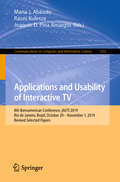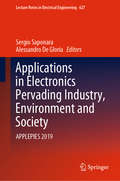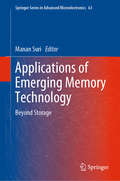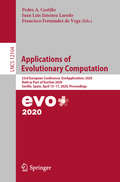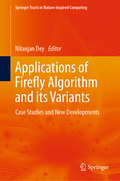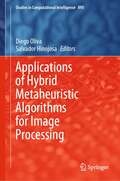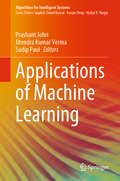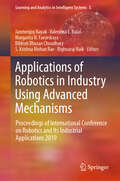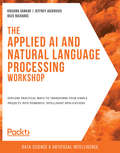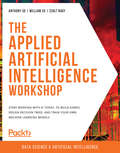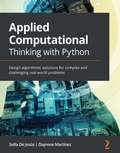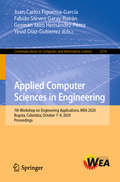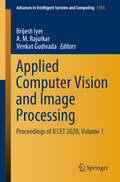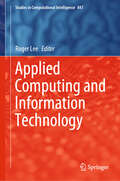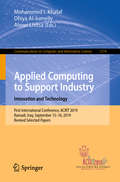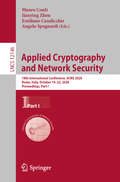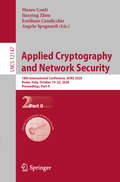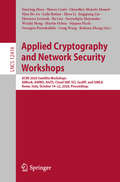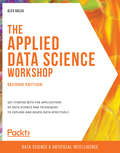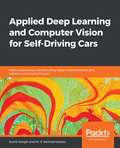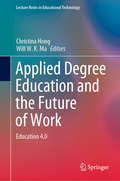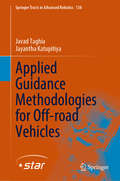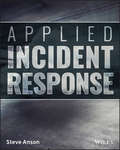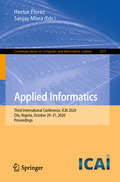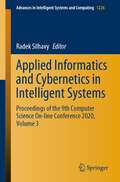- Table View
- List View
Applications and Usability of Interactive TV: 8th Iberoamerican Conference, jAUTI 2019, Rio de Janeiro, Brazil, October 29–November 1, 2019, Revised Selected Papers (Communications in Computer and Information Science #1202)
by María J. Abásolo Raoni Kulesza Joaquín D. Pina AmargósThis book constitutes the refereed proceedings of the 8th Iberoamerican Conference on Applications and Usability of Interactive Television, jAUTI 2019, in Rio de Janeiro, Brazil, in October 2019.The 10 full papers presented were carefully reviewed and selected from 35 submissions. The papers are organized in topical sections on Design and Development; Second Screen and Crossmedia; Interaction Techniques and Technologies; Accessibility; User Experience.
Applications in Electronics Pervading Industry, Environment and Society: APPLEPIES 2019 (Lecture Notes in Electrical Engineering #627)
by Alessandro De Gloria Sergio SaponaraThis book provides a thorough overview of cutting-edge research on electronics applications relevant to industry, the environment, and society at large. It covers a broad spectrum of application domains, from automotive to space and from health to security, while devoting special attention to the use of embedded devices and sensors for imaging, communication and control. The book is based on the 2019 ApplePies Conference, held in Pisa, Italy in September 2019, which brought together researchers and stakeholders to consider the most significant current trends in the field of applied electronics and to debate visions for the future. Areas addressed by the conference included information communication technology; biotechnology and biomedical imaging; space; secure, clean and efficient energy; the environment; and smart, green and integrated transport. As electronics technology continues to develop apace, constantly meeting previously unthinkable targets, further attention needs to be directed toward the electronics applications and the development of systems that facilitate human activities. This book, written by industrial and academic professionals, represents a valuable contribution in this endeavor.
Applications of Emerging Memory Technology: Beyond Storage (Springer Series in Advanced Microelectronics #63)
by Manan SuriThe book intends to bring under one roof research work of leading groups from across the globe working on advanced applications of emerging memory technology nanodevices. The applications dealt in the text will be beyond conventional storage application of semiconductor memory devices. The text will deal with material and device physical principles that give rise to interesting characteristics and phenomena in the emerging memory device that can be exploited for a wide variety of applications. Applications covered will include system-centric cases such as – caches, NVSRAM, NVTCAM, Hybrid CMOS-RRAM circuits for: Machine Learning, In-Memory Computing, Hardware Security - RNG/PUF, Biosensing and other misc beyond storage applications. The book is envisioned for multi-purpose use as a textbook in advanced UG/PG courses and a research text for scientists working in the domain.
Applications of Evolutionary Computation: 23rd European Conference, EvoApplications 2020, Held as Part of EvoStar 2020, Seville, Spain, April 15–17, 2020, Proceedings (Lecture Notes in Computer Science #12104)
by Pedro A. Castillo Juan Luis Jiménez Laredo Francisco Fernández de VegaThis book constitutes the refereed proceedings of the 23rd European Conference on Applications of Evolutionary Computation, EvoApplications 2020, held as part of Evo*2020, in Seville, Spain, in April 2020, co-located with the Evo*2020 events EuroGP, EvoMUSART and EvoCOP.The 44 full papers presented in this book were carefully reviewed and selected from 62 submissions. The papers cover a wide spectrum of topics, ranging from applications of bio-inspired techniques on social networks, evolutionary computation in digital healthcare and personalized medicine, soft-computing applied to games, applications of deep-bioinspired algorithms, parallel and distributed systems, and evolutionary machine learning.
Applications of Firefly Algorithm and its Variants: Case Studies and New Developments (Springer Tracts in Nature-Inspired Computing)
by Nilanjan DeyThe book discusses advantages of the firefly algorithm over other well-known metaheuristic algorithms in various engineering studies. The book provides a brief outline of various application-oriented problem solving methods, like economic emission load dispatch problem, designing a fully digital controlled reconfigurable switched beam nonconcentric ring array antenna, image segmentation, span minimization in permutation flow shop scheduling, multi-objective load dispatch problems, image compression, etc., using FA and its variants. It also covers the use of the firefly algorithm to select features, as research has shown that the firefly algorithm generates precise and optimal results in terms of time and optimality. In addition, the book also explores the potential of the firefly algorithm to provide a solution to traveling salesman problem, graph coloring problem, etc
Applications of Hybrid Metaheuristic Algorithms for Image Processing (Studies in Computational Intelligence #890)
by Diego Oliva Salvador HinojosaThis book presents a collection of the most recent hybrid methods for image processing. The algorithms included consider evolutionary, swarm, machine learning and deep learning. The respective chapters explore different areas of image processing, from image segmentation to the recognition of objects using complex approaches and medical applications. The book also discusses the theory of the methodologies used to provide an overview of the applications of these tools in image processing. The book is primarily intended for undergraduate and postgraduate students of science, engineering and computational mathematics, and can also be used for courses on artificial intelligence, advanced image processing, and computational intelligence. Further, it is a valuable resource for researchers from the evolutionary computation, artificial intelligence and image processing communities.
Applications of Machine Learning (Algorithms for Intelligent Systems)
by Prashant Johri Jitendra Kumar Verma Sudip PaulThis book covers applications of machine learning in artificial intelligence. The specific topics covered include human language, heterogeneous and streaming data, unmanned systems, neural information processing, marketing and the social sciences, bioinformatics and robotics, etc. It also provides a broad range of techniques that can be successfully applied and adopted in different areas. Accordingly, the book offers an interesting and insightful read for scholars in the areas of computer vision, speech recognition, healthcare, business, marketing, and bioinformatics.
Applications of Robotics in Industry Using Advanced Mechanisms: Proceedings of International Conference on Robotics and Its Industrial Applications 2019 (Learning and Analytics in Intelligent Systems #5)
by Janmenjoy Nayak Valentina E. Balas Margarita N. Favorskaya Bibhuti Bhusan Choudhury S. Krishna Mohan Rao Bighnaraj NaikThis book shares important findings on the application of robotics in industry using advanced mechanisms, including software and hardware. It presents a collection of recent trends and research on various advanced computing paradigms such as soft computing, robotics, smart automation, power control, and uncertainty analysis. The book constitutes the proceedings of the 1st International Conference on Application of Robotics in Industry using Advanced Mechanisms (ARIAM2019), which offered a platform for sharing original research findings, presenting innovative ideas and applications, and comparing notes on various aspects of robotics. The contributions highlight the latest research and industrial applications of robotics, and discuss approaches to improving the smooth functioning of industries. Moreover, they focus on designing solutions for complex engineering problems and designing system components or processes to meet specific needs, with due considerations for public health and safety, including cultural, societal, and environmental considerations. Taken together, they offer a valuable resource for researchers, scientists, engineers, professionals and students alike.
The Applied AI and Natural Language Processing Workshop - Second Edition: Explore practical ways to transform your simple projects into powerful intelligent applications
by Krishna Sankar Jeffrey JackovichIf you are a machine learning enthusiast, data scientist, or programmer who wants to explore AWS's artificial intelligence and machine learning capabilities, this book is for you. Although not necessary, a basic understanding of AI and NLP will assist with grasping key topics quickly.
The Applied Artificial Intelligence Workshop: Start working with AI today, to build games, design decision trees, and train your own machine learning models
by Zsolt Nagy Anthony So William SoWith knowledge and information shared by experts, take your first steps towards creating scalable AI algorithms and solutions in Python, through practical exercises and engaging activities Key Features Learn about AI and ML algorithms from the perspective of a seasoned data scientist Get practical experience in ML algorithms, such as regression, tree algorithms, clustering, and more Design neural networks that emulate the human brain Book Description You already know that artificial intelligence (AI) and machine learning (ML) are present in many of the tools you use in your daily routine. But do you want to be able to create your own AI and ML models and develop your skills in these domains to kickstart your AI career? The Applied Artificial Intelligence Workshop gets you started with applying AI with the help of practical exercises and useful examples, all put together cleverly to help you gain the skills to transform your career. The book begins by teaching you how to predict outcomes using regression. You'll then learn how to classify data using techniques such as k-nearest neighbor (KNN) and support vector machine (SVM) classifiers. As you progress, you'll explore various decision trees by learning how to build a reliable decision tree model that can help your company find cars that clients are likely to buy. The final chapters will introduce you to deep learning and neural networks. Through various activities, such as predicting stock prices and recognizing handwritten digits, you'll learn how to train and implement convolutional neural networks (CNNs) and recurrent neural networks (RNNs). By the end of this applied AI book, you'll have learned how to predict outcomes and train neural networks and be able to use various techniques to develop AI and ML models. What you will learn Create your first AI game in Python with the minmax algorithm Implement regression techniques to simplify real-world data Experiment with classification techniques to label real-world data Perform predictive analysis in Python using decision trees and random forests Use clustering algorithms to group data without manual support Learn how to use neural networks to process and classify labeled images Who this book is for The Applied Artificial Intelligence Workshop is designed for software developers and data scientists who want to enrich their projects with machine learning. Although you do not need any prior experience in AI, it is recommended that you have knowledge of high school-level mathematics and at least one programming language, preferably Python. Although this is a beginner's book, experienced students and programmers can improve their Python skills by implementing the practical applications given in this book.
Applied Computational Thinking with Python: Design algorithmic solutions for complex and challenging real-world problems
by Sofia De Jesus Dayrene MartinezUse the computational thinking philosophy to solve complex problems by designing appropriate algorithms to produce optimal results across various domainsKey FeaturesDevelop logical reasoning and problem-solving skills that will help you tackle complex problemsExplore core computer science concepts and important computational thinking elements using practical examplesFind out how to identify the best-suited algorithmic solution for your problemBook DescriptionComputational thinking helps you to develop logical processing and algorithmic thinking while solving real-world problems across a wide range of domains. It's an essential skill that you should possess to keep ahead of the curve in this modern era of information technology. Developers can apply their knowledge of computational thinking to solve problems in multiple areas, including economics, mathematics, and artificial intelligence.This book begins by helping you get to grips with decomposition, pattern recognition, pattern generalization and abstraction, and algorithm design, along with teaching you how to apply these elements practically while designing solutions for challenging problems. You'll then learn about various techniques involved in problem analysis, logical reasoning, algorithm design, clusters and classification, data analysis, and modeling, and understand how computational thinking elements can be used together with these aspects to design solutions. Toward the end, you will discover how to identify pitfalls in the solution design process and how to choose the right functionalities to create the best possible algorithmic solutions.By the end of this algorithm book, you will have gained the confidence to successfully apply computational thinking techniques to software development.What you will learnFind out how to use decomposition to solve problems through visual representationEmploy pattern generalization and abstraction to design solutionsBuild analytical skills required to assess algorithmic solutionsUse computational thinking with Python for statistical analysisUnderstand the input and output needs for designing algorithmic solutionsUse computational thinking to solve data processing problemsIdentify errors in logical processing to refine your solution designApply computational thinking in various domains, such as cryptography, economics, and machine learningWho this book is forThis book is for students, developers, and professionals looking to develop problem-solving skills and tactics involved in writing or debugging software programs and applications. Familiarity with Python programming is required.
Applied Computer Sciences in Engineering: 7th Workshop on Engineering Applications, WEA 2020, Bogota, Colombia, October 7–9, 2020, Proceedings (Communications in Computer and Information Science #1274)
by Juan Carlos Figueroa-García Fabián Steven Garay-Rairán Germán Jairo Hernández-Pérez Yesid Díaz-GutierrezThis volume constitutes the refereed proceedings of the 7th Workshop on Engineering Applications, WEA 2020, held in Bogota, Colombia, in October 2020.The 32 revised full papers and 12 short papers presented in this volume were carefully reviewed and selected from 136 submissions. The papers are organized in the following topical sections: computational intelligence; computer science; optimization; bioengineering; military applications; simulation, IoT and networks; power applications.
Applied Computer Vision and Image Processing: Proceedings of ICCET 2020, Volume 1 (Advances in Intelligent Systems and Computing #1155)
by Brijesh Iyer A. M. Rajurkar Venkat GudivadaThis book gathers high-quality research papers presented at the International Conference on Computing in Engineering and Technology (ICCET 2020) [formerly ICCASP]. A flagship conference on engineering and emerging next-generation technologies, it was jointly organized by Dr. Babasaheb Ambedkar Technological University and MGMs College of Engineering, Nanded, India on 9–11 January 2020. Focusing on applied computer vision and image processing, this proceedings volume includes papers on image processing, computer vision, pattern recognition, and DSP/DIP applications in healthcare systems.
Applied Computing and Information Technology (Studies in Computational Intelligence #847)
by Roger LeeThis book gathers the outcomes of the 7th International Conference on Applied Computing and Information Technology (ACIT 2019), which was held on May 29–31, 2019 in Honolulu, Hawaii. The aim of the conference was to bring together researchers and scientists, businesspeople and entrepreneurs, teachers, engineers, computer users, and students to discuss the various fields of computer science and to share their experiences and exchange new ideas and information in a meaningful way. Further, they presented research results on all aspects (theory, applications and tools) of computer and information science, and discussed the practical challenges encountered in their work and the solutions they adopted to overcome them. The book highlights the best papers from those accepted for presentation at the conference. They were chosen based on review scores submitted by members of the program committee and underwent further rigorous rounds of review. From this second round, 15 of the conference’s most promising papers were selected for this Springer (SCI) book and not the conference proceedings. We eagerly await the important contributions that we know these authors will make to the field of computer and information science.
Applied Computing to Support Industry: First International Conference, ACRIT 2019, Ramadi, Iraq, September 15–16, 2019, Revised Selected Papers (Communications in Computer and Information Science #1174)
by Dhiya Al-Jumeily Mohammed I. Khalaf Alexei LisitsaThis book constitutes the refereed proceedings of the First International Conference on Applied Computing to Support Industry: Innovation and Technology, ACRIT 2019, held in Ramadi, Iraq, in September 2019. The 38 revised full papers and 1 short paper were carefully reviewed and selected from 159 submissions. The papers of this volume are organized in topical sections on theory, methods and tools to support computer science; computer security and cryptography; computer network and communication; real world application in information science and technology.
Applied Cryptography and Network Security: 18th International Conference, ACNS 2020, Rome, Italy, October 19–22, 2020, Proceedings, Part I (Lecture Notes in Computer Science #12146)
by Mauro Conti Jianying Zhou Emiliano Casalicchio Angelo SpognardiThis two-volume set of LNCS 12146 and 12147 constitutes the refereed proceedings of the 18th International Conference on Applied Cryptography and Network Security, ACNS 2020, held in Rome, Italy, in October 2020. The conference was held virtually due to the COVID-19 pandemic. The 46 revised full papers presented were carefully reviewed and selected from 214 submissions. The papers were organized in topical sections named: cryptographic protocols cryptographic primitives, attacks on cryptographic primitives, encryption and signature, blockchain and cryptocurrency, secure multi-party computation, post-quantum cryptography.
Applied Cryptography and Network Security: 18th International Conference, ACNS 2020, Rome, Italy, October 19–22, 2020, Proceedings, Part II (Lecture Notes in Computer Science #12147)
by Mauro Conti Jianying Zhou Emiliano Casalicchio Angelo SpognardiThis two-volume set of LNCS 12146 and 12147 constitutes the refereed proceedings of the 18th International Conference on Applied Cryptography and Network Security, ACNS 2020, held in Rome, Italy, in October 2020.The conference was held virtually due to the COVID-19 pandemic. The 46 revised full papers presented were carefully reviewed and selected from 214 submissions. The papers were organized in topical sections named: cryptographic protocols cryptographic primitives, attacks on cryptographic primitives, encryption and signature, blockchain and cryptocurrency, secure multi-party computation, post-quantum cryptography.
Applied Cryptography and Network Security Workshops: ACNS 2020 Satellite Workshops, AIBlock, AIHWS, AIoTS, Cloud S&P, SCI, SecMT, and SiMLA, Rome, Italy, October 19–22, 2020, Proceedings (Lecture Notes in Computer Science #12418)
by Jianying Zhou Mauro Conti Chuadhry Mujeeb Ahmed Man Ho Au Lejla Batina Zhou Li Jingqiang Lin Eleonora Losiouk Bo Luo Suryadipta Majumdar Weizhi Meng Martín Ochoa Stjepan Picek Georgios Portokalidis Cong Wang Kehuan ZhangThis book constitutes the proceedings of the satellite workshops held around the 18th International Conference on Applied Cryptography and Network Security, ACNS 2020, in Rome, Italy, in October 2020. The 31 papers presented in this volume were carefully reviewed and selected from 65 submissions. They stem from the following workshops: AIBlock 2020:Second International Workshop on Application Intelligence and Blockchain Security AIHWS 2020:First International Workshop on Artificial Intelligence in Hardware Security AIoTS 2020:Second International Workshop on Artificial Intelligence and Industrial Internet-of-Things Security Cloud S&P 2020:Second International Workshop on Cloud Security and Privacy SCI 2020:First International Workshop on Secure Cryptographic Implementation SecMT 2020:First International Workshop on Security in Mobile Technologies SiMLA 2020: Second International Workshop on Security in Machine Learning and its Applications
The Applied Data Science Workshop: Get started with the applications of data science and techniques to explore and assess data effectively, 2nd Edition
by Alex GaleaDesigned with beginners in mind, this workshop helps you make the most of Python libraries and the Jupyter Notebook's functionality to understand how data science can be applied to solve real-world data problems. Key Features Gain useful insights into data science and machine learning Explore the different functionalities and features of a Jupyter Notebook Discover how Python libraries are used with Jupyter for data analysis Book Description From banking and manufacturing through to education and entertainment, using data science for business has revolutionized almost every sector in the modern world. It has an important role to play in everything from app development to network security. Taking an interactive approach to learning the fundamentals, this book is ideal for beginners. You'll learn all the best practices and techniques for applying data science in the context of real-world scenarios and examples. Starting with an introduction to data science and machine learning, you'll start by getting to grips with Jupyter functionality and features. You'll use Python libraries like sci-kit learn, pandas, Matplotlib, and Seaborn to perform data analysis and data preprocessing on real-world datasets from within your own Jupyter environment. Progressing through the chapters, you'll train classification models using sci-kit learn, and assess model performance using advanced validation techniques. Towards the end, you'll use Jupyter Notebooks to document your research, build stakeholder reports, and even analyze web performance data. By the end of The Applied Data Science Workshop, you'll be prepared to progress from being a beginner to taking your skills to the next level by confidently applying data science techniques and tools to real-world projects. What you will learn Understand the key opportunities and challenges in data science Use Jupyter for data science tasks such as data analysis and modeling Run exploratory data analysis within a Jupyter Notebook Visualize data with pairwise scatter plots and segmented distribution Assess model performance with advanced validation techniques Parse HTML responses and analyze HTTP requests Who this book is for If you are an aspiring data scientist who wants to build a career in data science or a developer who wants to explore the applications of data science from scratch and analyze data in Jupyter using Python libraries, then this book is for you. Although a brief understanding of Python programming and machine learning is recommended to help you grasp the topics covered in the book more quickly, it is not mandatory.
Applied Deep Learning and Computer Vision for Self-Driving Cars: Build autonomous vehicles using deep neural networks and behavior-cloning techniques
by Sumit Ranjan Dr. S. SenthamilarasuExplore self-driving car technology using deep learning and artificial intelligence techniques and libraries such as TensorFlow, Keras, and OpenCV Key Features Build and train powerful neural network models to build an autonomous car Implement computer vision, deep learning, and AI techniques to create automotive algorithms Overcome the challenges faced while automating different aspects of driving using modern Python libraries and architectures Book Description Thanks to a number of recent breakthroughs, self-driving car technology is now an emerging subject in the field of artificial intelligence and has shifted data scientists' focus to building autonomous cars that will transform the automotive industry. This book is a comprehensive guide to use deep learning and computer vision techniques to develop autonomous cars. Starting with the basics of self-driving cars (SDCs), this book will take you through the deep neural network techniques required to get up and running with building your autonomous vehicle. Once you are comfortable with the basics, you'll delve into advanced computer vision techniques and learn how to use deep learning methods to perform a variety of computer vision tasks such as finding lane lines, improving image classification, and so on. You will explore the basic structure and working of a semantic segmentation model and get to grips with detecting cars using semantic segmentation. The book also covers advanced applications such as behavior-cloning and vehicle detection using OpenCV, transfer learning, and deep learning methodologies to train SDCs to mimic human driving. By the end of this book, you'll have learned how to implement a variety of neural networks to develop your own autonomous vehicle using modern Python libraries. What you will learn Implement deep neural network from scratch using the Keras library Understand the importance of deep learning in self-driving cars Get to grips with feature extraction techniques in image processing using the OpenCV library Design a software pipeline that detects lane lines in videos Implement a convolutional neural network (CNN) image classifier for traffic signal signs Train and test neural networks for behavioral-cloning by driving a car in a virtual simulator Discover various state-of-the-art semantic segmentation and object detection architectures Who this book is for If you are a deep learning engineer, AI researcher, or anyone looking to implement deep learning and computer vision techniques to build self-driving blueprint solutions, this book is for you. Anyone who wants to learn how various automotive-related algorithms are built, will also find this book useful. Python programming experience, along with a basic understanding of deep learning, is necessary to get the most of this book.
Applied Degree Education and the Future of Work: Education 4.0 (Lecture Notes in Educational Technology)
by Christina Hong Will W. K. MaThis edited volume sets the stage for discussion on Education 4.0, with a focus on applied degree education and the future of work. Education 4.0 refers to the shifts in the education sector in response to Industry 4.0 where digital transformation is impacting the ways in which the world of work and our everyday lives are becoming increasingly automated. In the applied degree sector, significant change and transformation is occurring as leaders, educators and partners evolve smart campus environments to include blended learning, artificial intelligence, data analytics, BYOD devices, process automation and engage in curriculum renewal for and with industries and professions. This volume aims to profile and enhance the contribution of applied educational practice and research particularly in the applied degree sector and includes contributions that show case real world outcomes with students and industry as partners. This edited volume includes a wide range of topics, such as rethinking the role of education and educators; curriculum and the future of work; industrial partnership, collaboration and work integrated learning; vocational and professional practices; students, industry and professions as partners; employability skills and qualities for the 21st century world of work; innovative pedagogy and instructional design; adaptive learning technologies; and data analytics, assessment and feedback. The contributors come from different parts of the world in higher education, including, Canada, China, Finland, Germany, Hong Kong, Italy, Macau, Singapore and the United Kingdom.
Applied Guidance Methodologies for Off-road Vehicles (Springer Tracts in Advanced Robotics #138)
by Javad Taghia Jayantha KatupitiyaThis book provides methodologies for designing and implementing guidance algorithms for autonomous vehicles. These algorithms make important decision regarding how to steer and drive a ground vehicle in order to safely stay on an intended path, thereby making the vehicle driverless. The design tools provided in this book enable the reader to develop highly practical and real-world implementable guidance algorithms that will deliver high-accuracy driving for field vehicles. (They are equally applicable for on-road vehicles.) The book covers a variety of vehicle types, including wheeled vehicles, tracked vehicles, wheeled and tracked vehicles towing trailers, and four-wheel-steer and four-wheel-drive vehicles. It also covers active trailers that are driven and steered. Vehicles used in agriculture, mining and road construction are subjected to unpredictable and significant disturbances. The robust control methodologies presented can successfully compensate for these disturbances, as confirmed by the experimental results presented. Though the majority of the methodologies presented are based on sliding-mode controllers, other robust control methodologies are also discussed. To help the reader decide which controller is best suited for his/her choice of vehicle, experimental results are presented in a comparative format.
Applied Incident Response
by Steve AnsonIncident response is critical for the active defense of any network, and incident responders need up-to-date, immediately applicable techniques with which to engage the adversary. Applied Incident Response details effective ways to respond to advanced attacks against local and remote network resources, providing proven response techniques and a framework through which to apply them. As a starting point for new incident handlers, or as a technical reference for hardened IR veterans, this book details the latest techniques for responding to threats against your network, including: Preparing your environment for effective incident response Leveraging MITRE ATT&CK and threat intelligence for active network defense Local and remote triage of systems using PowerShell, WMIC, and open-source tools Acquiring RAM and disk images locally and remotely Analyzing RAM with Volatility and Rekall Deep-dive forensic analysis of system drives using open-source or commercial tools Leveraging Security Onion and Elastic Stack for network security monitoring Techniques for log analysis and aggregating high-value logs Static and dynamic analysis of malware with YARA rules, FLARE VM, and Cuckoo Sandbox Detecting and responding to lateral movement techniques, including pass-the-hash, pass-the-ticket, Kerberoasting, malicious use of PowerShell, and many more Effective threat hunting techniques Adversary emulation with Atomic Red Team Improving preventive and detective controls
Applied Informatics: Third International Conference, ICAI 2020, Ota, Nigeria, October 29–31, 2020, Proceedings (Communications in Computer and Information Science #1277)
by Hector Florez Sanjay MisraThis book constitutes the thoroughly refereed papers of the Second International Conference on Applied Informatics, ICAI 2020, held in Ota, Nigeria, in October 2020. The 35 full papers were carefully reviewed and selected from 101 submissions. The papers are organized in topical sections on artificial intelligence; business process management; cloud computing; data analysis; decision systems; health care information systems; human-computer interaction; image processing; learning management systems; software design engineering.
Applied Informatics and Cybernetics in Intelligent Systems: Proceedings of the 9th Computer Science On-line Conference 2020, Volume 3 (Advances in Intelligent Systems and Computing #1226)
by Radek SilhavyThis book gathers the refereed proceedings of the Applied Informatics and Cybernetics in Intelligent Systems Section of the 9th Computer Science On-line Conference 2020 (CSOC 2020), held on-line in April 2020. Modern cybernetics and computer engineering in connection with intelligent systems are an essential aspect of ongoing research. This book addresses these topics, together with automation and control theory, cybernetic applications, and the latest research trends.
